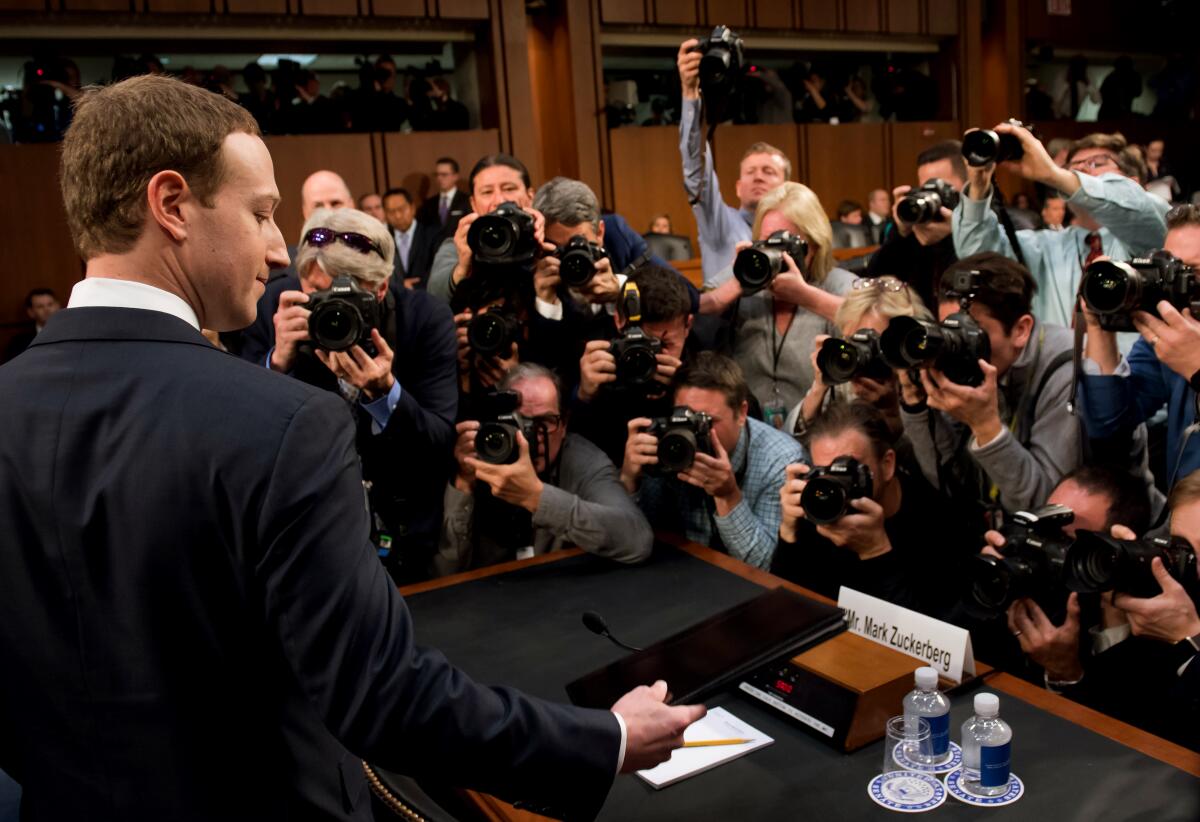Editorial: Facebook hands its microphone to lying politicians, Twitter takes it away

Facebook has become a prime outlet for presidential campaign messaging, with President Trump and his Democratic rivals collectively spending more than $1 million every week on targeted ads, according to published reports. So it was disturbing, to say the least, when Facebook altered its rules recently to exempt politicians and political parties from its ban on false advertising.
Not to put too fine a point on it, but the change amounted to a standing invitation for politicians to lie on Facebook — something it doesn’t allow any other advertisers to do. And this isn’t about free speech, or politicians’ ability to bend the truth in the comments posted to their profile pages and seen only by the people who follow them. It’s about paid speech, or their ability to use the immense power of Facebook’s platform to show masses of voters deceptive ads tailored to those voters’ preferences and weaknesses.
To demonstrate the absurdity of the situation, a Democratic political strategist in San Francisco named Adriel Hampton recently ran an ad on Facebook with a wholly made-up claim that conservative Sen. Lindsey Graham (R-S.C.) supported the liberal Green New Deal bill — a stunt intended to rankle some of Graham’s constituents. After Facebook took the ad down, Hampton filed papers Monday to run for governor of California in 2022, enabling him to run false ads like the one about Graham without interference from Facebook’s fact-checkers.
Facebook and its chief executive, Mark Zuckerberg, insist that voters deserve access to the unfiltered words of their politicians so they can decide for themselves what to believe. “By limiting political speech,” the company asserted, “we would leave people less informed about what their elected officials are saying and leave politicians less accountable for their words.”
There is an enormous difference, however, between not censoring candidates’ remarks and handing them a bullhorn to amplify untruths across the electorate, which is what Facebook is doing. By contrast, Twitter announced Wednesday that the company would no longer run political ads of any kind. “We believe political message reach should be earned, not bought,” CEO Jack Dorsey tweeted. In plain English, that means candidates will still be able to post comments that their followers will see and possibly retweet, but they won’t be able to pay to blast them directly to thousands or millions of Twitter users.
Dorsey also threw some shade toward Facebook, which has taken numerous steps in recent years to crack down on the scourge of fake accounts and fraudulent posts that came to light in the 2016 election. “It‘s not credible for us to say: ‘We’re working hard to stop people from gaming our systems to spread misleading info, buuut if someone pays us to target and force people to see their political ad … well ... they can say whatever they want!’” Dorsey tweeted.
Admittedly, the problem is much easier to identify than the solution. The 1st Amendment bars the government from setting rules for online truthfulness, and while private platforms such as Twitter and Facebook can set their own standards for what they’ll allow, it’s a fraught and complicated task for private industry to distinguish lies from edgy opinions. Nor do we want giant tech companies acting as gatekeepers to political speech.
Yet Facebook wants to wash its hands of any responsibility for how its megaphone can be abused, saying it’s the public’s job to winnow facts from the chaff of deceptive fiction. That’s a self-serving stance aimed at keeping the campaign ad dollars flowing while shielding the company from complaints of bias, which Republicans have been browbeating “Big Tech” with for months. If Facebook won’t embrace the elegant solution offered by Twitter, it should set clear standards for political ads that protect against deliberate deception and provably false claims, and come up with a transparent and nonpartisan way to enforce them. Scores of media companies, including newspapers and cable TV networks, do this routinely. So can Facebook.
More to Read
A cure for the common opinion
Get thought-provoking perspectives with our weekly newsletter.
You may occasionally receive promotional content from the Los Angeles Times.










